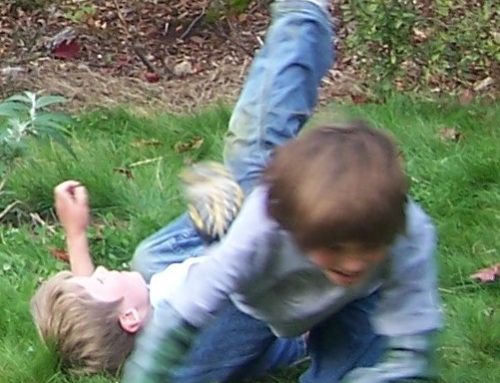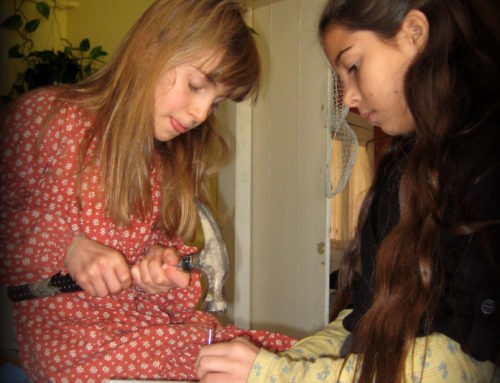Children’s Sex Lives
(part two in series on body space/freedom of movement)
Both on the subject of allowing children to trust themselves and their bodies and on the task of bringing children into full parity rather than enforcing inequality through limiting, I have come to examine our ideas around children and sex. We make many assumptions and justifications regarding our need to control and limit children in this area; but do such ideas really help to bring children into parity, support power with, or teach them to trust themselves?
Sex and children is a hugely taboo subject in our culture. Our cultural attitudes toward sex are often secretive or perverse without an acceptable and healthy expression. Sex is certainly an area in which we attempt to control children’s behavior with fear, coercion or misinformation and lies.Perhaps this is out of our own embarrassment, discomfort, or cultural conditioning, and our own uneasy relationship to sex and sexuality. A.S. Neill, founder and headmaster of the Famous Summerhill School in England illustrates, that by such behavior we breed sexual perversion and psychological dysfunction in children (and in the future adults they become). What do we teach kids about sex and their sexuality by using authoritarian tactics, and how could we address the issue of sex with children in a way that supports a positive and healthy relationship to sex and sexuality? If we want empower children to take responsibility and have control over their own bodies and lives and help them learn to trust themselves, then it seems that we must also support them in governing their sexual lives and empowering them to know and to decide what level of touch or sexual expression they are ready for.
Is it appropriate and healthy for parents to control children’s sex play with each other, especially when such control is gained through punishment, fear, coercion and guilt? Is this not just a way to enforce inequality rather than help bring children into parity and help them be responsible for themselves? If we want to bring children into parity, could we not engage with them in such a way as to give them knowledge they need to be entrusted with their own bodies, their own sexuality and their sex lives? Given the proper and adequate information, could children learn to make decisions about sex that don’t lead to harm of self or others but that are healthy choices for the people involved?
In giving this power to children, we cultivate in them self-trust and understanding of themselves as sexual beings. To only punish children for sexual expression does not teach them anything about healthy sexuality; and, rather than cultivating healthy sexual expression, leads to perversion. A.S. Neill explores this in experiences in his free school and firmly supports a healthy expression of sexuality for children. He gives details of children who do not have an opportunity to understand themselves and their sexuality, the neurotic behaviors they develop as a result, and the dysfunctional or confused experiences they have in adulthood. We must help children come into a healthy relationship with their sexuality so that they can have the skills to navigate this area of their lives on their own by the time they reach sexual maturity. The consequence of not cultivating these skills starting in childhood means a lot of learning and floundering as they become sexually active, which could be at great cost to themselves and others.
What you live is what they learn
I am not suggesting that we should advocate sexual intercourse between seven-year-olds, or overwhelm children with information about sex all at once or before they are interested, but that children could learn healthy expressions of their sexuality with themselves and others that are appropriate to them and their level of sexual development. This is a life-long process, it starts with small children exploring and being curious about their bodies, with adult modeling of comfortable and relaxed relationship and attitude toward their own and others bodies and sexuality. Your attitude and your behavior will teach your children far more than anything you say. If you want your children to have an empowered and healthy relationship to sex and sexuality, then also work on yours. We have lots of cultural conditioning to unlearn. Children want to know where babies come from… how do you feel when you hear this question from a child? What kind of answer do you give? Can you come up with an age-appropriate, truthful explanation and can you learn to have total easy and comfort when exploring these subjects with your children? If children are empowered about sex, sexuality, and sovereignty over their bodies, then the chances of such things being used as a tool for manipulation by peers, older children or adults, seems less likely.
I can see that adult authority, or perhaps more particularly adult guidance and support may make sense when there is inadequate information, lack of ability for a child to comprehend his/her actions, or when the actions of one child are disturbing the peace, well-being and safety of another. Otherwise it seems important to give children power over this aspect of their bodies as well and to help them to cultivate healthy relationships to their sexuality when and where they are ready. I believe that learning autonomy and self-regulation of sexuality at a young age will offer a foundation of self-knowledge and trust that will support healthy sexual expression and relationships in adulthood. If we only limit them and don’t help them to grow into responsibility for themselves, then how will they be able to take responsibility when we finally expect them to?


Leave A Comment